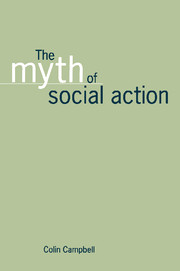Book contents
- Frontmatter
- Contents
- 1 Introduction
- 2 Action reported missing in action theory
- 3 Action and social action
- 4 Action versus social action
- 5 The rise of social situationalism
- 6 The argument by denial
- 7 Accounts and actions
- 8 The argument by exclusion
- 9 The argument through incorporation
- 10 The ‘learning everything from others’ thesis
- 11 The communicative act paradigm
- 12 The linguistic turn for the worse
- 13 The myth of social action
- 14 The obstacle which is social situationalism
- 15 Epilogue: bringing action back in
- Notes
- Bibliography
- Index
5 - The rise of social situationalism
Published online by Cambridge University Press: 07 May 2010
- Frontmatter
- Contents
- 1 Introduction
- 2 Action reported missing in action theory
- 3 Action and social action
- 4 Action versus social action
- 5 The rise of social situationalism
- 6 The argument by denial
- 7 Accounts and actions
- 8 The argument by exclusion
- 9 The argument through incorporation
- 10 The ‘learning everything from others’ thesis
- 11 The communicative act paradigm
- 12 The linguistic turn for the worse
- 13 The myth of social action
- 14 The obstacle which is social situationalism
- 15 Epilogue: bringing action back in
- Notes
- Bibliography
- Index
Summary
As we have seen, the ‘social action perspective’ is distinguished by two assumptions. The first is that the subject-matter of sociology comprises social action and/or social interaction (the way that social action is defined effectively obscures the difference between these terms). The second is that the term ‘social action’ means conduct which possesses a ‘social meaning’. Naively, one might have thought that shifting the criterion of definition from action to meaning would involve some attempt to indicate how ‘social’ meaning differed from ‘non-social’ meaning. But contemporary sociologists have generally opted for a more radical solution which serves to justify the treatment of social action as the exclusive subject-matter of the discipline. This involves defining nonsocial action out of existence altogether – something which is achieved by presuming that all meaning is necessarily social. Consequently, not only can there be no such thing as non-social action, but defining action and defining social action inevitably become one and the same. This position is reached by accepting a basic syllogism, one which it is not unreasonable to suggest underpins the central dogma of contemporary sociology. This syllogism is as follows: (a) all actions possess meaning (this is their defining characteristic); (b) all meaning is essentially social; therefore (c) all actions must be social actions. As can be seen, this syllogism builds on the presumption that social actions are actions which possess a social meaning.
- Type
- Chapter
- Information
- The Myth of Social Action , pp. 38 - 51Publisher: Cambridge University PressPrint publication year: 1996



